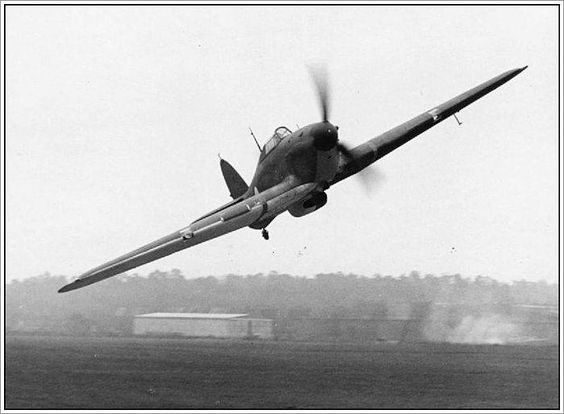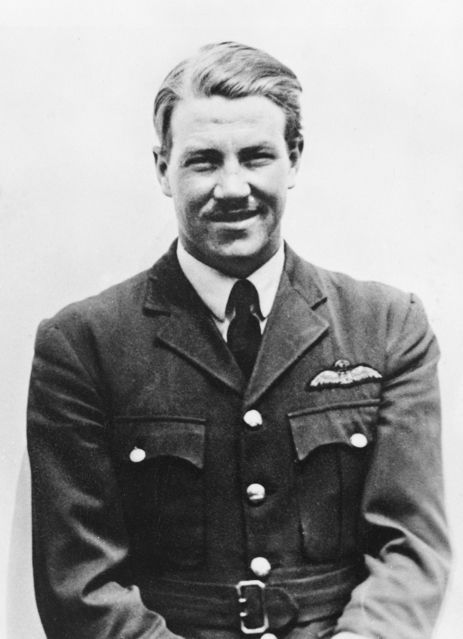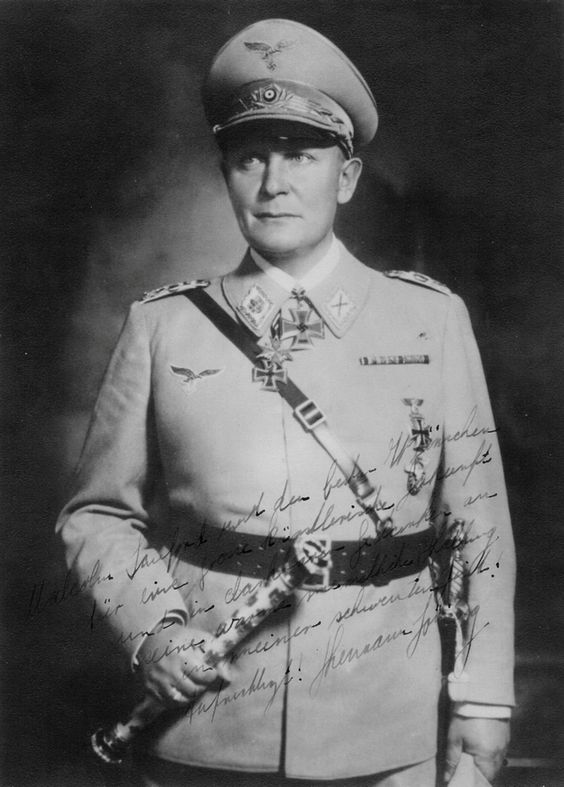Thursday 1 August 1940
 |
| Hawker Hurricane of 56. Sqn "Punjab" in low pass - RAF North Weald, August 1940. |
overpower the English Air Force with all the forces at its command, in the shortest possible time.The strategy (for the moment) is to focus all attacks on the Royal Air Force, its installations and production facilities. Interestingly, it calls for scaled-back attacks on the southern ports "in view of our own forthcoming operations." The implication is that Hitler wants to keep the English ports in that area operational so that the Kriegsmarine can use them during the invasion. The priority of attacks on English naval units "may be reduced."
The overall tone of the Directive is that the entire outcome of the proposed invasion lies with air superiority. Once you gain that, everything else falls into place. Gone is the gibberish about sealing off both ends of the English Channel with mines, picayune details about where landings will take place, and so forth. While German doctrine during the Battle of England is widely derided, this is an extremely modern tactical perspective that remains in place today - and this is the doctrine's first application in history.
Hitler does hedge his bets in one key regard. He states, rather ominously:
I reserve to myself the right to decide on terror attacks as measures of reprisal.To date, London and other large cities largely have been spared (save for production facilities and bombing errors). However, the clear implication of this phrase is that London will become a target should the air superiority campaign falter. There is a large body of thought, and not just in Germany, that terror bombing of large cities alone will force a government to sue for peace. Evidence on this as of 1 August 1940 is inconclusive, as the Luftwaffe terror bombing of places like Warsaw and Rotterdam did not by themselves force immediate surrenders by the bombed governments. However, those bombings were in fact closely followed by surrenders - which may or may not have been coincidences.
Another way of looking at this phrase is that, once the bombings of London commence, Hitler has given up on the invasion. This may be bad news for the citizens of the large cities being bombed, but is good news in a strategic sense - for those that survive.
Within the German government, this directive is seen by the Naval command (OKL) as Hitler "siding with the Luftwaffe." However, even they concede in the OKL war diary that "it will be necessary to wait until the first phase of the air operation is over" before the navy can start transporting troops. The reality is that airpower is entering "the next level" of importance at this point in history, and indeed any navy - while vitally important in and of itself - must have air cover to survive.
Not contained in the Directive is a tacit understanding, not formalized but "understood," that the Luftwaffe will have to make serious progress within the first week of a full-scale attack for a 1940 invasion to be feasible. Despite the supposed "start" of the Battle of Britain on 10 July, the Luftwaffe still has not brought all of its power to bear in a focused attack. That campaign is still in the planning stages.
It already is highly likely that the invasion will have to be postponed to 1941, as the summer months are drifting away. However, British aircraft production is above that of Germany, and the submarine blockade of England is proving to be extremely porous. Battles of attrition and production never play to Germany's strengths against a strong and capable adversary with a solid industrial base. Time for one big heave of the dice.
During the afternoon, a large Luftwaffe force heads for Dungeness. RAF No. 145 Squadron scrambles to intercept them off the coast. Both sides lose a plane, the RAF a Hurricane (the pilot is lost) and the Luftwaffe a Henschel Hs 126. One of the Junkers Ju 88s is damaged and the pilot eventually perishes after making it back to base.
Things really heat up around 15:30 when large forces of bombers intrude over the Essex coastline. About 30 Heinkel He 111s and Dornier Do 17s make it to Norwich unnoticed and bomb the railway and Boulton-Paul Aircraft Works there. There also is damage in nearby industries. There are six deaths and 60 other casualties. The Luftwaffe later loses one or two Dornier Do 17s. The lack of interception is perhaps due in part to Fighter Command being distracted by another operation over Cherbourg.
The RAF mounts a rare daylight raid against a Luftwaffe base at Cherbourg after reconnaissance shows a large fighter buildup there. Blenheim bombers of RAF No. 56 Squadron attack the airfield there and the Luftwaffe rises to meet them. The RAF causes damage to the field, but a wild melee develops over the airport. The British lose several bombers - the Luftwaffe awards five claims. While the RAF destroyed and damaged some aircraft on the field, the vital ingredient - eliminating enemy pilots - was missing. Overall, the attack showed that attacking the Luftwaffe at its strength is unwise at this point.
At night, there is a friendly fire incident. A British night-fighter of RAF No. 29 Squadron shoots down an "enemy" plane that turns out to be a No. 1 Group Fairey Battle.
During the night, the Luftwaffe drops pamphlets which contain the text of Hitler's 19 July "Last Appeal to Reason" speech. This is the first propaganda drop since the fall of France. The RAF bombs the Leeuwarden, Holland, Dortmund, and Haamstede airfields, as well as oil installations in northwest Germany. It sends 62 bombers against the Ruhr.
Today is an excellent illustration of how number-counting losses during the Battle of Britain is prone to bias. Many accounts disregard or at least under-count the British Blenheim losses over Cherbourg, while counting any Luftwaffe aircraft that leaves the battle streaming smoke as a loss (many such damaged planes make it back to base). Overall, the losses for the day are about even. However, you will see histories state that the ratio is something like a 9-1 ratio of Luftwaffe to RAF losses.
Lt. Günther Rall, Staffelkapitän of 8./JG 52, is promoted to Oberleutnant. Rall is a top Luftwaffe ace.
Adolf Galland of JG 26 is awarded the Knight's Cross of the Iron Cross (Ritterkreuz). He has the top victory total in the Luftwaffe at this point.
 |
| Prinz Eugen at its launching in 1938. It now is ready for battle. |
After a long chase and two misses with torpedoes, U-59 (Kptl. Joachim Matz) torpedoes and sinks 1981 ton timber freighter Sigyn about 70 miles northwest of Tory Island in the southwest approaches at 03:45. All 23 onboard survive.
Dutch submarine O-21 spots U-60 on its way back to Bergen. It fires two torpedoes, but both miss. Another submarine, O-22, also spots U-60, which is oblivious to all the attention it is receiving but is too far away to attack.
U-25 (Kapitänleutnant Heinz Beduhn) is lost around this time in the North Sea, likely by hitting a mine. All 49 onboard perish. When submarines run into mishaps, they often just disappear forever.
The Luftwaffe attacks convoy FN 239 about a dozen miles off of Flamborough Head, Yorkshire and damages British freighters Gothic and Highlander for the loss of two planes.
The Luftwaffe also operates just off of the south coast of Ireland and damages freighter Kerry Head.
Destroyer HMS Fearless collides with patrol boat Flying Wing off of the Mull of Kintyre, causing damage that needs repair. The damage will put it out of action for a couple of months.
The Italian Royal Navy sets up a submarine base (BETASOM) in Bordeaux, France to support operations in the Atlantic south of Lisbon.
Kriegsmarine heavy cruiser Prinz Eugen is commissioned, along with destroyer Z27.
The destroyer USS Niblack (DD 424, Lt. Commander Edward R. Durgin) is commissioned.
British submarine HMS Tuna (Lt. Commander Maurice K. Cavenagh-Mainwaring) and destroyer HMS HMS Cattistock (L 35, Lt. Commander Robert A. Ewing) are commissioned.
U-96 is launched (Kapitänleutnant Heinrich Lehmann-Willenbrock).
 |
| U-25. |
In a rare incident, Italian destroyer Vivaldi spots a British submarine south of Sardinia and heads straight for it. The destroyer manages to ram British submarine HMS Oswald and capture its crew. There are 55 survivors who become POWs, 3 men perish.
Italian submarine Goffredo Mameli spots 1041 ton Greek freighter Roula off Crete, surfaces, and sinks it with its deck gun.
Operation Hurry and Operation Spark are in progress. Hurry is a massive fleet operation to ferry a dozen Hurricanes to Malta on the carrier Ark Royal. Spark is a diversionary operation off of Minorca. In addition, a diversionary sortie by Admiral Cunningham's fleet based at Alexandria is at sea, composed of a Force A and a Force B. The latter returns to Alexandria today when battleship Malaya has a mechanical issue, but Force A remains at sea to divert attention from the vulnerable carrier force heading eastward. As the day ends, the Ark Royal is still out of range of Malta but closing quickly.
Another convoy is en route to Malta. It is headed around Africa and through the Suez Canal carrying heavy anti-aircraft guns. Governor Dobbie on Malta informs the War Office that he needs men to man the guns, not just the guns themselves because of the limited population on the island.
Battle of the Indian Ocean: German raider Atlantis captures Norwegian freighter Talleyrand and sinks it, taking the crew prisoner.
Spy Stuff: After their stay near Lisbon, the Duke and Duchess of Windsor depart for the Bahamas, where the Duke is the new Governor-General. While he was expecting the courtesy of at least a British destroyer, instead he is placed on US ocean liner Excalibur.
Switzerland: Commander-in-chief Guisan continues his martial tone. He gives a radio speech in which he reiterates the country's neutrality and vows to "defend the passage of the Alps to the end." While the Germans have made some small gestures toward the country such as closing the border, they have not indicated any interest in subduing Switzerland.
Japan: The Japanese government releases more of the British citizens it has arrested on espionage charges.
Japanese Foreign Minister Yōsuke Matsuoka coins the phrase "The Great East Asian Co-Prosperity Sphere" during a press interview. This simply gives a name to Japan's obvious imperialist ambitions which are cloaked in the phrase "Asia for Asiatics." Another euphemism is "New Order in Asia."
As if to emphasize its overseas ambitions immediately, the Japanese government demands additional rights in French Indochina.
Free France: Charles de Gaulle appeals to French Canadians for their support.
United States: The US Navy establishes the Alaskan Sector within the 13th Naval District.
Soviet Union: In a speech to the Supreme Soviet, Foreign Minister Vyacheslav Molotov reaffirms the USSR's neutrality. He also, however, is quite satisfied with the recent acquisition of the Baltic States and indicates that future acquisitions to restore the full pre-World War I extent of the Russian empire are under consideration.
British Homefront: Petrol is rationed and new car sales are banned. A solution? Electric cars! Government figures show that the number of such registrations in June zoomed to 79, and they are becoming popular in Australia, too. Electric cars, of course, are a very old idea from the turn of the century. They have the advantage of being small and fitting into tiny parking spots.
The Führer and Supreme Commander
of the Armed Forces
Führer Headquarters,
1st August 1940.
10 copies
Directive No. 17 For the conduct of air and sea warfare against England
In order to establish the necessary conditions for the final conquest of England, I intend to intensify air and sea warfare against the English homeland. I, therefore, order as follows :
1. The German Air Force is to overpower the English Air Force with all the forces at its command, in the shortest possible time. The attacks are to be directed primarily against flying units, their ground installations, and their supply organizations, but also against the aircraft industry, including that manufacturing antiaircraft equipment.
2. After achieving temporary or local air superiority the air war is to be continued against ports, in particular against stores of food, and also against stores of provisions in the interior of the country.
Attacks on south coast ports will be made on the smallest possible scale, in view of our own forthcoming operations.
3. On the other hand, air attacks on enemy warships and merchant ships may be reduced except where some particularly favorable target happens to present itself, where such attacks would lend additional effectiveness to those mentioned in paragraph 2, or where such attacks are necessary for the training of aircrews for further operations.
4. The intensified air warfare will be carried out in such a way that the Air Force can at any time be called upon to give adequate support to naval operations against suitable targets. It must also be ready to take part in full force in 'Undertaking Sea Lion'.
5. I reserve to myself the right to decide on terror attacks as measures of reprisal.
6. The intensification of the air war may begin on or after 5th August. The exact time is to be decided by the Air Force after the completion of preparations and in the light of the weather.
The Navy is authorized to begin the proposed intensified naval war at the same time.
signed: ADOLF HITLER
 |
| Joe Dimaggio on the cover of Life, 1 August 1940. |
July 1940
July 1, 1940: Vichy France
July 2, 1940: Arandora Star
July 3, 1940: Operation Catapult at Mers El Kébir
July 4, 1940: Romania In Crisis
July 5, 1940: The Five Freedoms
July 6, 1940: Hitler's High Point
July 7 1940: Dakar And Ringo
July 8, 1940: Tea Rationing in England
July 9, 1940: Battle of Calabria
July 10, 1940: Battle of Britain Begins
July 11, 1940: "Nous, Philippe Petain"
July 12, 1940: Enter Laval
July 13, 1940: German Surface Raiders Attack!
July 14, 1940: Bastille/Mourning Day
July 15, 1940: Tallest Man Dies
July 16, 1940: Plans for Sea Lion
July 17, 1940: Burma Road Closed
July 18, 1940: FDR Runs Again
July 19, 1940: Last Appeal To Reason
July 20, 1940: First Night Fighter Victory
July 21, 1940: Soviets Absorb Baltic States
July 22, 1940: First RAF Night Fighter Victory
July 23, 1940: Invasion False Alarm
July 24, 1940: The Meknés Incident
July 25, 1940: Black Thursday for RAF
July 26, 1940: Capture The Duke?
July 27, 1940: What's Up, Doc?
July 28, 1940: Destroyers Pulled From Dover
July 29, 1940: Barbarossa On The Burner
July 30, 1940: Hitler Delays Sealion
July 31, 1940: Bloody Wednesday of Olkusz
August 1940
August 1, 1940: Two RN Subs Lost
August 2, 1940: Operation Hurry
August 3, 1940: Italians Attack British Somaliland
August 4, 1940: Dueling Legends in the US
August 5, 1940: First Plan for Barbarossa
August 6, 1940: Wipe Out The RAF
August 7, 1940: Burning Oil Plants
August 8, 1940: True Start of Battle of Britain
August 9, 1940: Aufbau Ost
August 10, 1940: Romania Clamps Down On Jews
August 11, 1940: Huge Aerial Losses
August 12, 1940: Attacks on Radar
August 13, 1940: Adler Tag
August 14, 1940: Sir Henry's Mission
August 15, 1940: Luftwaffe's Black Thursday
August 16, 1940: Wolfpack Time
August 17, 1940: Blockade of Britain
August 18, 1940: The Hardest Day
August 19, 1940: Enter The Zero
August 20, 1940: So Much Owed By So Many
August 21, 1940: Anglo Saxon Incident
August 22, 1940: Hellfire Corner
August 23, 1940: Seaplanes Attack
August 24, 1940: Slippery Slope
August 25, 1940: RAF Bombs Berlin
August 26, 1940: Troops Moved for Barbarossa
August 27, 1940: Air Base in Iceland
August 28, 1940: Call Me Meyer
August 29, 1940: Schepke's Big Day
August 30, 1940: RAF's Bad Day
August 31, 1940: Texel Disaster
2020






